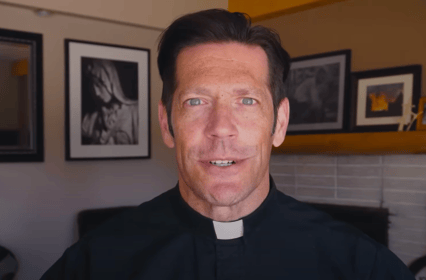It’s only by recalling how God entered our lives that can we overcome the loneliness and ingratitude that threaten to stifle us. When did you hear His thunder?
A line in the Gospel of John caught my attention a couple of Sundays ago; the whole crowd following and listening to Jesus audibly hears the voice of God. Some say it sounds like thunder and others say it is the voice of an angel. Whoa, what? I had to re-read it several times, as I had never paid attention to that verse before.
John 12:28-29 reads: “Then a voice came from heaven, ‘I have glorified it and I will glorify it again.’ The crowd there heard it and said it was thunder; but others said, ‘An angel has spoken to him.’” And it isn’t just in the listeners’ heads -- Jesus verifies what they heard by saying “This voice did not come for my sake but for yours.”
As I reflected on this passage, I thought about people in the crowd as they lived the rest of their lives over the years. Did they appreciate the fact that not only did they see and interact with Jesus, but they also heard God the Father’s voice? And that this hearing was a physical experience, not like hearing God speak through Scripture or hearing him in your heart. Did they think back on the day they heard the thunder that was God speaking? How did that shape their lives?
Shattering loneliness
At the same time that I was thinking about this, I was reading a book by Erik Varden, who is the current bishop of Trondheim in Norway. His book, The Shattering of Loneliness, explores the act of remembering throughout Scripture.
In the second chapter, “Remember You Were a Slave in Egypt,” Bishop Varden invites us to remember the ways we have seen God work in our story. He’s not talking about the big, wonderful moments in our life where we were blessed with a beautiful grace -- like getting our dream job, or witnessing the birth of our child, or meeting someone who would become our spouse. Instead Varden draws attention to our personal journey from slavery to freedom. This includes the moments of sin, pain, and shame in our lives. Christ uses those times to redeem us.
Articulating our own story of deliverance will help us because “Only by recalling what I was can I acknowledge what, by grace, I have become.” To continue to appreciate where grace has taken us, we must remain aware of and grateful for our journey. The trouble is that “Forgetfulness threatens to envelop us, however. The smog of perceived entitlement obscures grateful retrospect … We claim rights where grace is at work, and so are made ungracious."
Forgetfulness and ingratitude
What if the people in the crowd that day with Jesus slowly forgot about hearing God’s voice. What if those who were healed or forgiven spent their life enjoying their newfound freedom and health, but slowly stopped thinking about the person who saved them? This happens in the healing of the ten lepers—only one man comes back to say thank you to Jesus. The less we remember, the less grateful we are. And the less grateful we are, the farther away we walk from God, the source of life’s goodness and our fulfillment.
As Bishop Varden writes, “Each of us will have his or her own story of deliverance. We should not make a fetish of it, nor proclaim it indiscriminately, but we are not to forget.”
Remember the thunder
Take a moment to prayerfully recall today. What is your story of deliverance? What sin has Jesus freed you, personally, from? What years of wandering in the wilderness of disbelief, apathy, lukewarmness, or self-righteousness has He brought you out of? What darkness were you experiencing that He pierced through with the light of truth and love? Where in your life has the voice of God thundered, either in slow prolonged rumbles building to a crescendo over time, or in short bursts of pulsating intensity?
Don’t forget this thunder. Don’t pretend it didn’t happen, or that it wasn’t that big of a deal. Own the painfulness of your mistakes and thank God for your redemption -- from yesterday through tomorrow.

